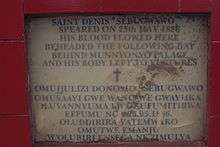Munyonyo Martyrs Shrine
| Munyonyo Martyrs Shrine | |
|---|---|
|
Church and martyrdom spot. | |
| Basic information | |
| Location |
Munyonyo, Kampala, |
| Affiliation | Roman Catholic |
| District | Archdiocese of Kampala |
| Country | Uganda |
| Year consecrated | 2017 |
| Ecclesiastical or organizational status | Shrine |
| Leadership | Greyfriars |
| Website | Homepage |
| Architectural description | |
| Architect(s) | Robert Sseremba |
| Groundbreaking | 2015 |
| Completed | 2016 |
| Specifications | |
| Capacity | 1600 |
| Height (max) | 47 m. |
The Munyonyo Martyrs’ Shrine is a Roman Catholic shrine dedicated to the Ugandan Martyrs.
Location
The church is located at Munyonyo, Kampala, in Central Uganda. Munyonyo is located approximately 13 kilometres (8.1 mi), by road, south of the central business district of Kampala, Uganda's capital and largest city in that East African country.
Overview
Munyonyo Martyrs Shrine is the martyrdom place of leaders in Royal enclave; St. Andrew Kaggwa and St. Denis Ssebugwawo - Uganda Martyrs killed by King Mwanga II on 26 May 1886 canonized by Pope Paul VI in 1964. It is also a place where in 1886 Saint Charles Lwanga - leader of Christian community in Uganda baptized St. Kizito, St. Mbaga, St. Gyavira and St. Muggaga.
History
it was at Munyonyo where King Mwanga took the fateful decision to begin putting Christians to death. The blood of Ugandan’s martyrs was shed on the soil around Munyonyo. The first three Christians to render their lives for Christ’s sake after the King’s decision did so on 26 May 1886 – they were: St. Denis Ssebugwawo, St. Andrew Kaggwa and St. Pontiano Ngondwe.

In Munyonyo, all of the King’s Christian pageboys were captured and sentenced to death at Namugongo (the Kingdom’s designated place for execution). The prisoners were grievously bound to each other, and were made to walk their life’s final journey escorted by merciless soldiers; theirs was a brutal and soul-inspiring last pilgrimage. On the way to Namugongo, at a lonely spot by the side of a road in Kyamula, Pontiano was martyred – he was the third Ugandan whose love of Christ outshone his desire for life itself. That same day in Munyonyo, servant of God, Fr. Symeon Lourdel (Mapeera) was desperately seeking an audience with the King Mwanga in order to intervene for condemned Christians. However, he was not permitted to see King.
Having intuited the grave and imminent danger which was about to befall Uganda’s Christian community, as night fell on 25 May 1886, Charles Lwanga (the leader of Uganda’s Christian community) secretly baptised four catechumens at Munyonyo: St. Kizito, St. Mbaga, St. Gyavira and St. Muggaga The very morning, King Mwanga brought his whole court before him and separated the Christians from the rest saying, "those who do not pray stand by me, those who do pray stand over there". He proceeded to ask the fifteen boys and young men standing apart whether they were Christian and, if they were, whether they intended to remain so. When they answered "Yes" with strength and courage, Mwanga condemned them all to death. After a short imprisonment, the future martyrs subsequently walked, staggered and were often dragged over a number of days until they finally reached the martyrdom site in Namugongo (3 June 1886).
Recent events
In 2014, Uganda celebrated 50 years since the Uganda Martyrs were canonized and elevated to Sainthood by Pope Paul VI on 18 October 1964. Uganda Martyrs Shrine in Munyonyo is a thanksgiving monument for their canonization. Official groundbreaking was on 3 May 2015 by Papal Nuncio to Uganda; Archbishop Michael August Blume and Cardinal Emmanuel Wamala. Re-devepomnet includes construction of new church shrine, museum, offices and martyrdom spots of the saints.[1]
Since October 2013, shrine is administrated by a franciscan religious order of Greyfriars - Conventual Franciscans. [2]
Pope Francis visited and blessed the cornerstone of the Shrine on 27 November 2015 during his apostolic journey to Africa.[3]
See also
References
- ↑ "Papal nuncio launches construction of Munyonyo martyrs shrine - NTV". ntv.co.ug.
- ↑ "Shrine Page". munyonyo-shrine.ug.
- ↑ "Pope Francis Apostolic Journeys outside Italy". vatican.va.
